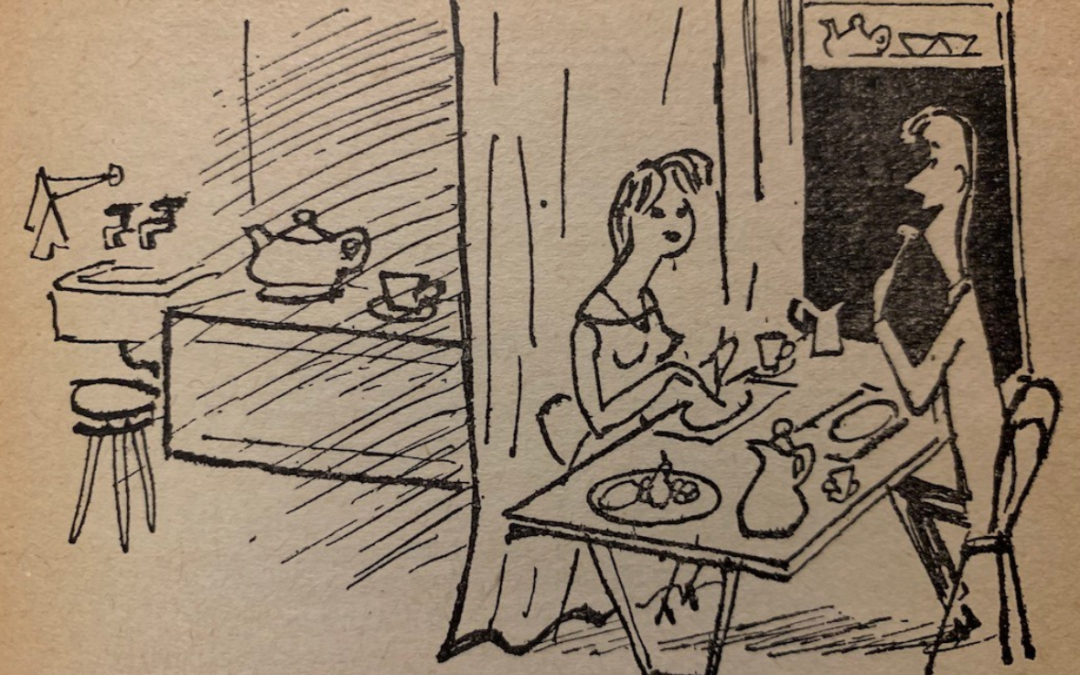By Fabio Parasecoli
How could a gay man, who loved food, express his passion for cooking and eating in socialist Poland? Easy: he created a fictional straight couple and had them write a cookbook meant to help singles (and the soon-to-be-married) improve their quality of life, at least in the kitchen.
The late 1950s and early 1960s were a fascinating time when it comes to representations of men and cooking. Especially in the English-speaking world, food books and magazines were published that were specifically geared towards male audiences. Apparently, that was also the case in Poland, at the time of a political “thaw” after the death of Stalin and the beginning of Władysław Gomułka’s rise to power.
Encouraging male readers to face their fears in the kitchen
One example of that is Książka kucharska dla samotnych i zakochanych (A cookbook for those alone and those in love), a little volume from 1958, the first edition of which sold out in five weeks. The authors of the book are indicated as Maria Lemnis and Henryk Vitry. The real author, however, was a noted musicologist Tadeusz Żakiej (1915-1994), who wrote as Tadeusz Marek on music, and Maria Lemnis and Henryk Vitry on culinary topics.
The cookbook is particularly intriguing because Tadeusz Żakiej was gay. While homosexuality was more or less grudgingly accepted among Warsaw intellectuals and artists, it did not fare too well in the rest of Polish society, dominated by socialist moralism on the one hand, and the Catholic Church on the other. Polish secret police would often use homosexuality to discredit people. In 1959, for example, Michel Foucault (few people know he lived in Warsaw for a year directing the French Cultural Center and working on Madness and Civilization) was entrapped by one of his lovers and ultimately expelled from the country.
It is understandable that a gay man, who clearly loved food and cooking, felt more comfortable creating two fictional straight authors – and a married couple, to boot – to deal with the topic. In the book introduction, Żakiej actually makes up a whole life for them, using the characters also to encourage (male) singles and those unmarried but in a relationship to face their fears in the kitchen and enjoy expressing themselves at the stove.
Salads and befsztyk
The fictional couple insists that at first, just like their readers, they were not good with food, as cooking was not a subject taught at school and cookbooks could be intimidating. “Beginnings were not easy, believe us!” they state, informing us that they started from scrambled eggs and potatoes.
This lack of skill among the youth may point to a break, or at least a crisis, in the domestic transmission of culinary knowledge from cooks of other generations. In a society where gender parity was more advanced than elsewhere, women were often working outside of their homes. Especially in urban environments, it is likely they did not have much time to teach their offspring.
The fictional Maria and Henryk stay well within the accepted behaviours of the actual heterosexual couples of the period: over time, she becomes good at making salads, he at steaks (befsztyk, probably a weekend delicacy even for the better-off urbanites for which the author writes). They cooked their meals together, often for their friends.
Heteronormativity ruled, with the author declaring that “most of the time, loneliness ends with love, and love with marriage”. Of course, he has to mention the saying “the way to a man’s heart is through his stomach,” which he finds correct. It is interesting how the single person is imagined as a male, even if this is never clearly stated in the book.

Fighting male prejudice towards cooking
In that period, these subtle gender negotiations around cooking and eating were not unique to Poland. Although men were consuming food around the family table, in business meetings, at the bar for drinks after work, and at sporting events, they were not preoccupied with feeding their families on a daily basis.
In English-speaking cultures, cookbooks geared towards men were not a novelty, and had started to appear in the 1930s, displaying intriguing discursive strategies to take the stigma of femininity away from culinary activities. Cooking was presented as an artistic, creative activity, and recipes were often collected from famous men, giving more prestige to the text and avoiding threatening the readers’ masculinity.
Cooking on special occasions such as outdoor barbecues, carving the turkey for the holidays, or making Sunday breakfast were widely perceived as appropriate masculine activities. Since they were far from regular, these meals allowed men to display specific skills, without being interpreted as expressions of caregiving. Actually, by cooking only in very specific cases, men reaffirmed that daily domesticity was not part of their life world.
The fictional authors of Żakiej’s cookbook, however, do not agree with men who consider cooking as a degrading and shameful activity. For Żakiej, this attitude is only partly a result of snobbism, as in reality men often look down on cooking because they don’t have the faintest idea about it. Although these men may be able to brew a cup of tea or slice some sausage on a piece of bread, they consider the rest unreachable and enormously time consuming, including the need to go shopping (also considering the long lines at the time). Moreover, given that apartments for singles did not have full kitchens, the “authors” note, where would these single men store what they buy and the necessary culinary tools?

Single person’s food waste
Żakiej explains that the problem with cookbooks is that they were not written for individuals, with most recipes meant for 3-4 people, which made using ingredients in the right proportions difficult. Also, the author imagines kitchens as often dominated by mothers-in-law (a discrete jab to the strictures of traditional domesticity and family structures). It is, perhaps, the slow rise in independent urban living, as the urbanisation of Poland progressed, that is reflected in Zakiej’s book.
And then there was the issue of grocery shopping: “recipes are implacable”, as they always require a spoon of this and a pinch of that, which makes buying ingredients for specific recipes very complicated. And as it is necessary to purchase in certain quantities, waste was inevitable. This seems to be an urgent issue for the author, one that was particularly hard to accept in the lean times of socialism. “Every day, garbage bins get filled with huge quantity of dry bread and stale rolls, rancid butter, rotten sausage…which are the usual leftovers from the household of a single person.”
“Everybody among us likes to eat well and to one’s heart’s content”
Class, although never directly addressed, looms large in the cookbook. After all, the author belonged to the relatively well-off urban intelligentsia who could at least aspire to the lifestyle presented in the book, unlike most Poles. By underlining that their revenues were meagre, the fictional couple was trying to avoid readers perceiving them as elites and therefore not identifying with them and not trying the recipes they proposed.
Moreover, not everybody had easy access to many of the ingredients listed in the book, as shortages and kinks in the distribution system often made shopping for groceries time-consuming and frustrating. There is a whole section on how to organise a good, basic pantry, specifically to avoid long lines at busy moments (after work hours, pre-holiday periods) that cause all sorts of fights among people.

Żakiej seems bent on gently concealing the hard realities of the period, maybe to remain in the good graces of publishers and authorities. Here and there, he hints at the problems that had plagued the Polish food system before socialism, but he turns them into positives: “The forced diet during the war years became simply beneficial for many materially privileged gluttons [obżartuch], as it deprived them of many ‘luxurious’ ailments and suffering.”
In the section about food history, he criticises the excesses of the Polish gentry from the past, depicted as insensitive to the plight of their people. However, the author stops short of extolling any positive aspect in the recurrent insufficiency of basic ingredients he witnesses, which he admits could cause havoc, especially among the poorest segments of the population.

Nevertheless, Żakiej does not agree at all with the perception that food and cooking are bourgeois habits, as “everybody among us likes to eat well and to one’s heart’s content, both the ‘fair sex’ (or women) and the ‘worldly gentlemen’ (you know – men!)…Food is not just a sad necessity, but it can also be pleasure…a pleasure that is available to us not only during our whole life, but even…three times a day”.
However, eating well is not only about pleasure, but also helps in avoiding malnourishment, which the author describes as a problem for young single professionals. “Self-reliance requires greater responsibility concerning our behaviours towards our body and our health.”
Żakiej wrote for a segment of the Polish population that could afford three full meals a day (perhaps having one of them in a subsidised workplace canteen), had easier access to shopping (with only the most discreet hints at economising), and even practised sports. They wore ties, nice outfits and earrings, to which they dedicated attention (and so they should pay attention to what they ate, in the same measure).
These are busy people that come back home after work tired and “mentally exhausted”, with “upset nerves”. Their professional activities always sound very draining. What a busy life these imagined readers lead! Actually marriage could save many of these hardworking men, as future wives had to be not only “reasonable but also strong enough to convince their husbands to embrace a ‘rational way of life’”.
“Our little stabilization”
Evoking the zeitgeist of the years following the turbulent and violent Stalinist era, a more relaxed period that the poet Tadeusz Różewicz would later call “our little stabilisation”, Żakiej imagines his readers coming back home, changing clothes, freshening up, setting down a clean tablecloth, putting a flower in a vase, and playing quiet music on the radio.
This is single-life coziness, which also allows for a good production of gastric juices (fundamental for a healthy digestion). Readers are mostly assumed to be living in one room, but it is still a shelter against the accidents and worries of life. For that reason, that one room should be tidy and kept in order. One has to wash dishes before going to bed, to wake up to a well-arranged environment. A messy room makes men feel even lonelier, and makes them want to run away from it. Then again, nothing calms the nerves like contact with nature, so a walk outdoors or – even better – in a park, is always a good idea.

Although Żakiej repeatedly pointed out that his goal was not to moralise, judgements are passed quite often on habits he knew his society criticised. For instance, he asserted that while both reason and feelings are necessary when shopping, as our instincts guide us in diversifying our diet (which is necessary not only for pleasure but also for health), those same instincts are also responsible for the consumption of vodka and cigarettes. Actually, if one has to economise, one should do it on cigarettes, alcohol, coffee, and tea, but not on milk, vegetables, fruit, cottage cheese (twaróg) and cod.
Żakiej’s cookbook confirms that, although it may seem banal and irrelevant, food is squarely at the centre of conversations, controversies, and negotiations about what Poland is and should be in the future. In fact, food plays an increasingly relevant role in defining the cultural outlook, social status, and political worldviews of citizens from all walks of life.
Mateusz Halawa contributed information and analysis to this article. All images featured belong to the author of the article.





















